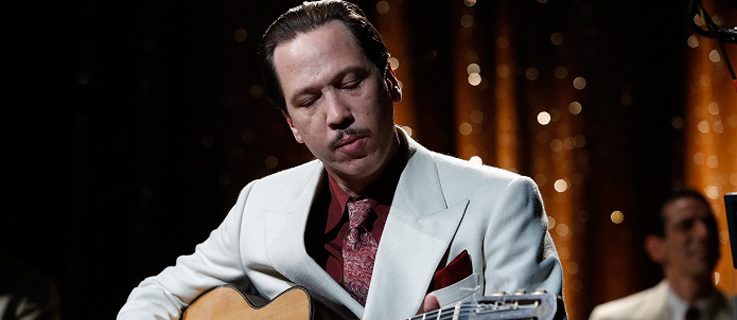“Django”, the film about the celebrated jazz guitarist Django Reinhardt, opened the Berlinale. Nevertheless, this film biography focuses less on his musical abilities – and instead concentrates on depicting his life as the son of a Sinti family during the Second World War.
The first sounds in Django arise, unsurprisingly, from a guitar; however the sight accompanying the jaunty strummed refrains proves far from harmonious. As gypsies gather in a French forest in 1943, German soldiers encroach upon their camp, ending their music with bullets. This prelude sets the scene for the tale to come — a biopic about famed jazz guitarist Django Reinhardt that’s less concerned with the results of his playing prowess, and more intrigued by how, with his Romani ancestry, he made it through the Second World War. Further, as the opening night film of the 67th Berlinale, it makes an important statement about a festival cognisant of the weight of history.
More lightning-fast melodic riffs follow as Django charts the mustachioed Reinhardt’s (Reda Ketab) efforts during such turbulent times: namely the invitations, and then demands, that he travel to Germany to play for well-connected and influential parties such as Goebbels; and, in tandem, the treatment of the Roma people that sees him scrambling to escape to Switzerland with his wife (Beata Palya) and mother (BimBam Merstein).
No dwelling on minutiae
Stepping behind the camera for the first time for his adaptation of Alexis Salatko’s novel, writer turned director Etienne Comar continues his fascination with the weight of choices; where his script for 2010’s
Of Gods and Men contemplated the decision by a group of monks to assist others even as it endangered their own lives,
Django places its titular protagonist in a similar position. When the film begins, he’s eager to ignore the conflict around him, remaining happy to fish and play divorced from politics. The more his talent brings him to the attention of the Nazi regime, however, the more he’s forced to engage with, understand — and, eventually, actively work to subvert — the tumultuous reality around him.
Still,
Django doesn’t particularly dwell on the minutiae — but, nor does it need to. With the topic of World War II rarely far from the cinema screen, audiences are well versed in the ghastly treatment that marked the era, with scenes of covert chatter and planning, and overt intimidation and cruelty, almost acting as shorthand for the atrocities that remain unseen here. A shot that extinguishes an old man’s life, the trampling and disrespect of a confiscating military entering a humble home, terse interrogation methods based upon discriminatory assumptions, destructive flames setting worldly possessions alight: these glimpses, coupled with an inescapable awareness of history, say plenty.
HISTORY FILLS GAPS
With the film soundtracked by Reinhardt’s lively playing, as well as an original piece based on a largely lost work crafted by the guitarist after the war, Comar’s approach also offers a powerful contrast between horror and artistry.
That’s the space the Berlinale inhabits by launching with an account of Reinhardt’s — and his music’s — survival. Minutes away from the Berlinale Palast
where
Django launched both its world premiere screening and the 2017 festival, reminders abound about the past the film depicts, with the Topography of Terror Documentation Center filling in the gaps in heartbreaking details.
Both the grand celebration of contemporary cinema and the unshakeable knowledge of harrowing previous events can co-exist, but there’s no denying that one shapes the other. Reinhardt learns this as
Django brings its thoughtful drama to an end — and, so does the Berlinale audience.
